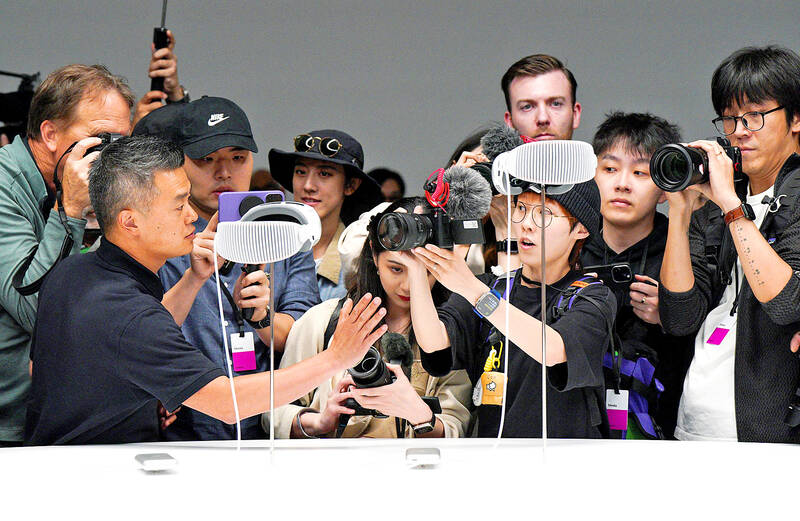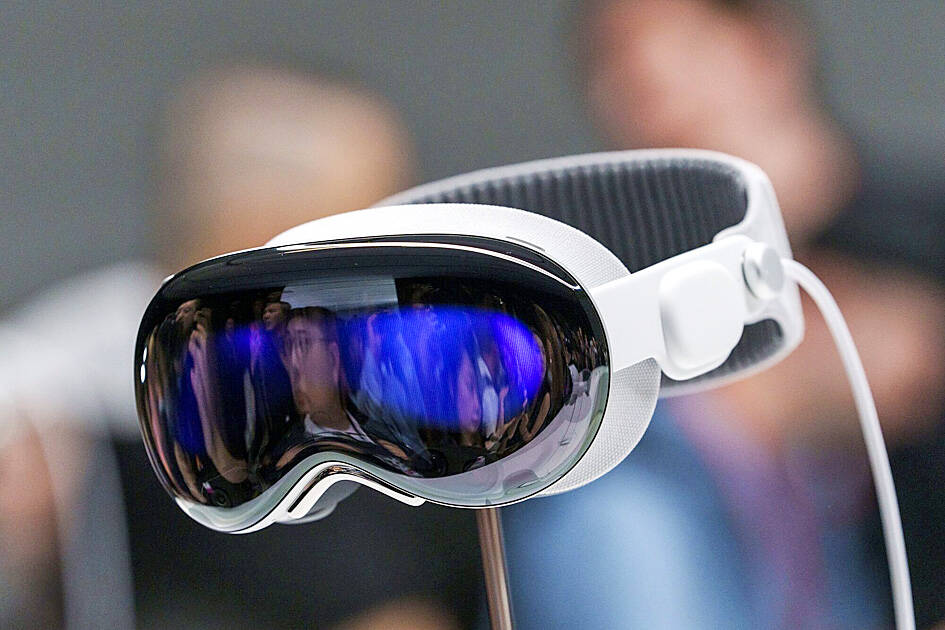Apple Inc on Monday unveiled a long-rumored headset that would place users between the virtual and real world, while also testing the technology trendsetter’s ability to popularize new-fangled devices after others failed to capture the public’s imagination.
After years of speculation, Apple CEO Tim Cook hailed the arrival of the sleek goggles — dubbed “Vision Pro” — at the company’s annual developers’ conference held on a park-like campus in Cupertino, California.
The device would be capable of toggling between virtual reality (VR) and augmented reality (AR), which projects digital imagery while users can still see objects in the real world.

Photo: Reuters
“This marks the beginning of a journey that will bring a new dimension to powerful personal technology,” Cook told the crowd.
Although Apple executives provided an extensive preview of the headset’s capabilities during the final half hour of Monday’s event, consumers would have to wait before they can get their hands on the device and prepare to pay a hefty price to boot. Vision Pro is to sell for US$3,500 once it is released in stores early next year.
“It’s an impressive piece of technology, but it was almost like a tease,” Gartner Inc analyst Tuong Nguyen said. “It looked like the beginning of a very long journey.”

Photo: Bloomberg
Instead of merely positioning the goggles as another vehicle for exploring virtual worlds or watching more immersive entertainment, Apple framed the Vision Pro as the equivalent of owning an ultrahigh-definition TV, surround-sound system, high-end camera, and state-of-the art camera bundled into a single piece of hardware.
The company emphasized that it drew upon its past decades of product design during the years it spent working on the Vision Pro, which Apple said involved more than 5,000 different patents.
The headset would be equipped with 12 cameras, six microphones and a variety of sensors that would allow users to control it and various apps with only their eyes and hand gestures.
The experience would not cause the recurring nausea and headaches that similar devices have in the past, Apple said.
The firm also developed a technology to create a three-dimensional digital version of each user to display during video conferencing.
Although the Vision Pro would not require physical controllers that can be clunky to use, the goggles would have to either be plugged into a power outlet or a portable battery tethered to the headset — a factor that could make it less attractive for some users.
“They’ve worked hard to make this headset as integrated into the real world as current technology allows, but it’s still a headset,” Insider Intelligence analyst Yory Wurmser said, adding that the unveiling was still a “fairly mind-blowing presentation.”
Even so, analysts are not expecting the Vision Pro to be a big hit right away. That is largely because of the hefty price, but also because most people still cannot see a compelling reason to wear something wrapped around their face for an extended period of time.
The public’s response to virtual, augmented and mixed reality has been decidedly ho-hum so far. Wedbush Securities Inc analyst Dan Ives estimated Apple would sell just 150,000 of the headsets during its first year on the market before escalating to 1 million headsets sold during the second year — a volume that would make the goggles a mere speck in the company’s portfolio.
By comparison, Apple sells more than 200 million of its marquee iPhones a year.
However, the iPhone was not an immediate sensation, with sales of fewer than 12 million units in its first full year on the market.

Semiconductor business between Taiwan and the US is a “win-win” model for both sides given the high level of complementarity, the government said yesterday responding to tariff threats from US President Donald Trump. Home to the world’s largest contract chipmaker, Taiwan Semiconductor Manufacturing Co (TSMC, 台積電), Taiwan is a key link in the global technology supply chain for companies such as Apple Inc and Nvidia Corp. Trump said on Monday he plans to impose tariffs on imported chips, pharmaceuticals and steel in an effort to get the producers to make them in the US. “Taiwan and the US semiconductor and other technology industries

SMALL AND EFFICIENT: The Chinese AI app’s initial success has spurred worries in the US that its tech giants’ massive AI spending needs re-evaluation, a market strategist said Chinese artificial intelligence (AI) start-up DeepSeek’s (深度求索) eponymous AI assistant rocketed to the top of Apple Inc’s iPhone download charts, stirring doubts in Silicon Valley about the strength of the US’ technological dominance. The app’s underlying AI model is widely seen as competitive with OpenAI and Meta Platforms Inc’s latest. Its claim that it cost much less to train and develop triggered share moves across Asia’s supply chain. Chinese tech firms linked to DeepSeek, such as Iflytek Co (科大訊飛), surged yesterday, while chipmaking tool makers like Advantest Corp slumped on the potential threat to demand for Nvidia Corp’s AI accelerators. US stock

The US Federal Reserve is expected to announce a pause in rate cuts on Wednesday, as policymakers look to continue tackling inflation under close and vocal scrutiny from US President Donald Trump. The Fed cut its key lending rate by a full percentage point in the final four months of last year and indicated it would move more cautiously going forward amid an uptick in inflation away from its long-term target of 2 percent. “I think they will do nothing, and I think they should do nothing,” Federal Reserve Bank of St Louis former president Jim Bullard said. “I think the

SUBSIDIES: The nominee for commerce secretary indicated the Trump administration wants to put its stamp on the plan, but not unravel it entirely US President Donald Trump’s pick to lead the agency in charge of a US$52 billion semiconductor subsidy program declined to give it unqualified support, raising questions about the disbursement of funds to companies like Intel Corp and Taiwan Semiconductor Manufacturing Co (台積電). “I can’t say that I can honor something I haven’t read,” Howard Lutnick, Trump’s nominee for commerce secretary, said of the binding CHIPS and Science Act awards in a confirmation hearing on Wednesday. “To the extent monies have been disbursed, I would commit to rigorously enforcing documents that have been signed by those companies to make sure we get